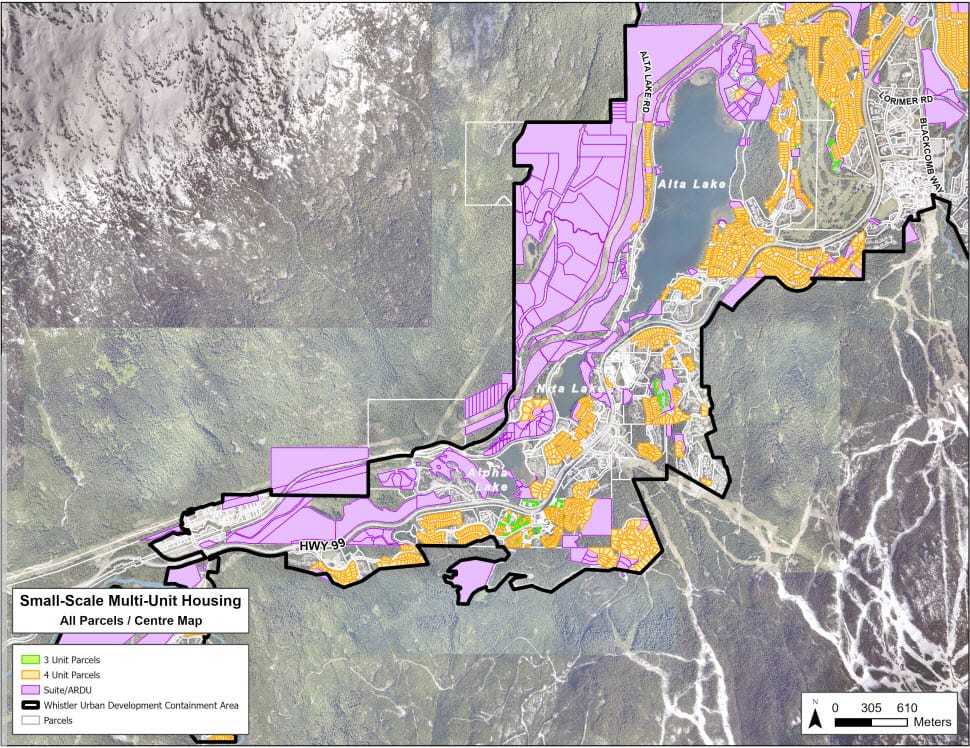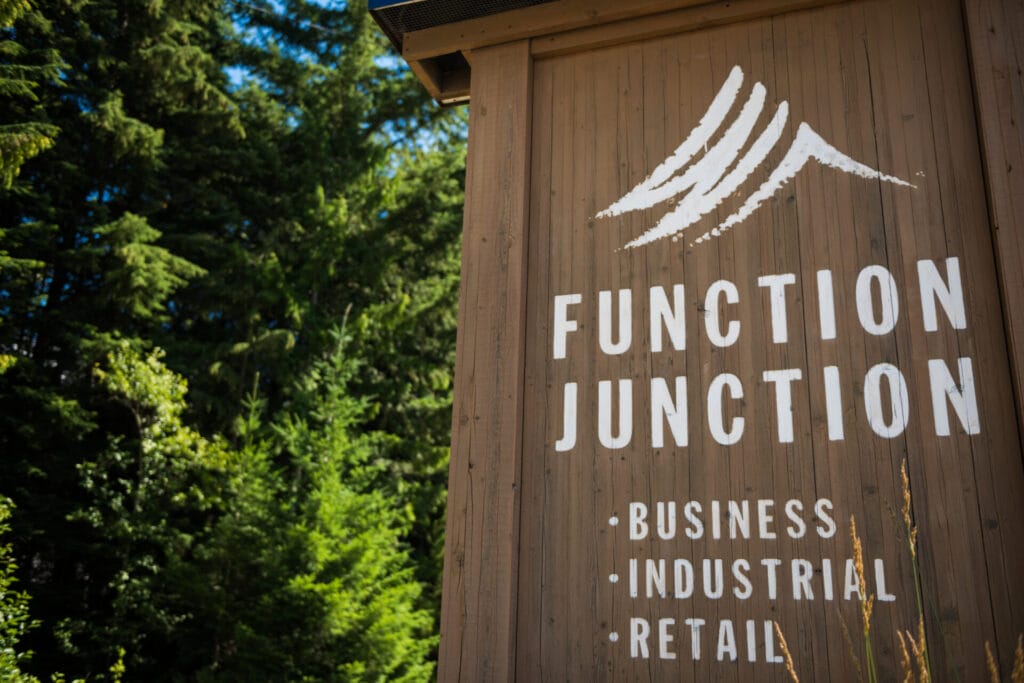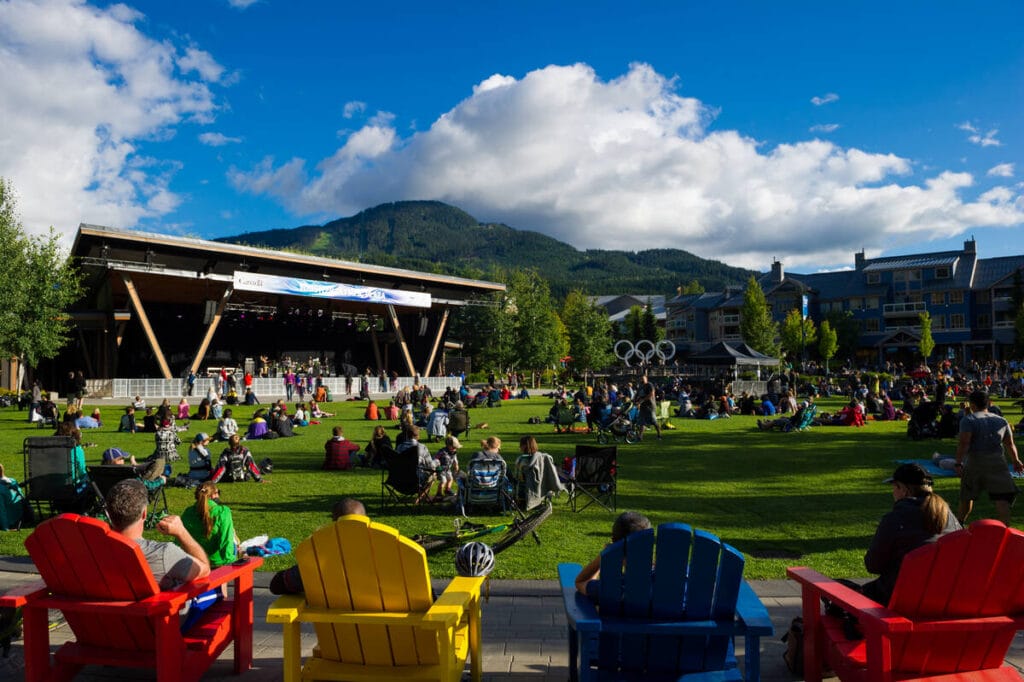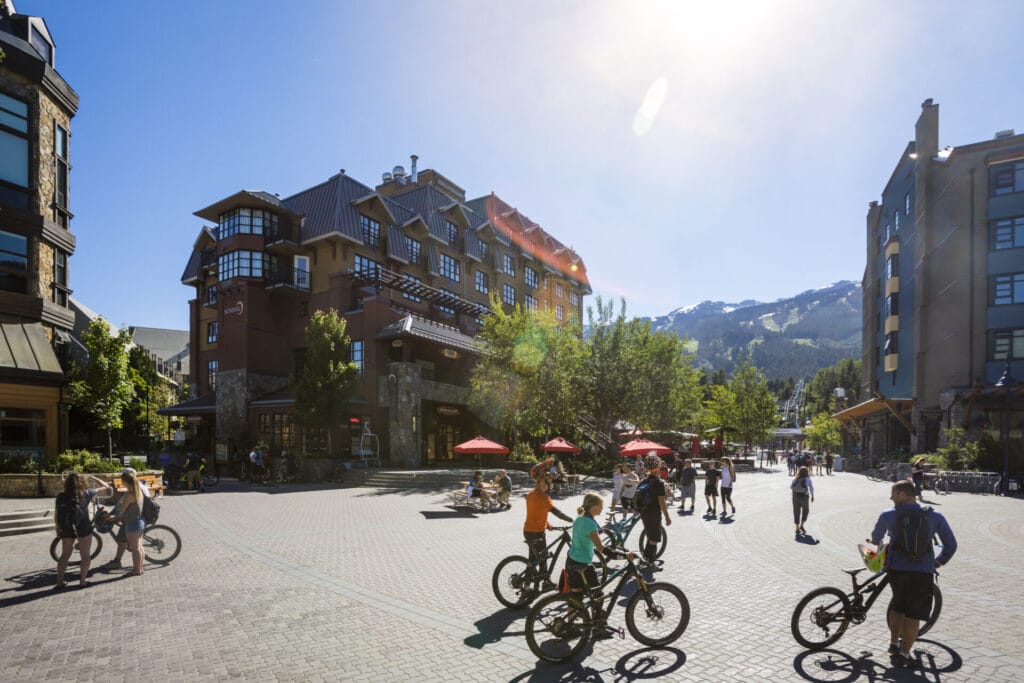New employee housing units slated for Function Junction; RMOW revenues rise in 2023
Looking to get caught up on the Tuesday, April 9 Council Meetings? We’ve pulled together some key stories from Committee of the Whole and the Regular Council Meeting, including:
- Whistler shifts to align with provincial housing legislation aimed at increasing housing supply (Bills 44, 46 and 47);
- Function Junction development on track to provide 24 more units of employee housing following zoning amendment;
- New Climate Action, Housing and Smart Tourism committees take shape;
- Strong tourism and local economy contribute to RMOW revenue spike in 2023; and
- Revised Code of Conduct returns for Council approval.
For all the details, check out the recording of the full meeting on whistler.ca.
Whistler prepares to incorporate new provincial housing legislation
Bill supporting the development of Small-Scale Multi-Unit Housing applies to 3500 Whistler properties
This week, Whistler’s Mayor and Council got their first look at what B.C.’s new provincial housing legislation could mean for the resort.
The June 30 deadline is fast approaching for the RMOW to pass new bylaws in accordance with the Province of B.C.’s “Homes for People” housing action plan that was released last spring. It aims to build more homes, faster.
Here in Whistler, it means we must align our bylaws with two recently introduced bills sparked by the strategy.
Bill 44 aims to support Small-Scale Multi-Unit Housing (SSMUH) development in what the province calls “restricted zones”: areas where current zoning bylaws limit residential use to single-family, detached dwellings or duplexes. Under the new laws, zoning must permit between three and four units on these properties, depending on lot size.
In Whistler, the legislation applies to 3500 properties.

A map showing where Small-Scale Multi-Unit Housing zoning changes will apply in the centre of Whistler. For all maps and details, read on on the new provincial housing legislation on whistler.ca.
“The legislation sets out what must be permitted under zoning; it does not prescribe that this number of units must be built,” RMOW Director of Planning Mike Kirkegaard said in his presentation to Council on Tuesday. “That is up to the property owner.”
Bill 46, meanwhile, is designed to facilitate more density around frequent transit services. Under the new legislation, local governments cannot deny rezoning applications that propose a density within provincial limits or require residential off-street parking within designated Transit-Oriented Development (TOD) Areas.
The Planning Department has laid out what the 400 metres surrounding the Gondola Exchange looks like, Whistler’s Transit-Oriented Development Area, in the maps provided on whistler.ca. Gondola Exchange is the area determined by the Province as Whistler’s TOD area.
It is difficult to estimate the potential uptake of the new SSMUH allowances, according to municipal staff. There are potential implications of the legislation on Whistler’s accommodation capacity limit, infrastructure and employee housing needs which will need to be assessed. For now, a set of guiding principles has been presented and a broad framework that paves the way for “bylaw testing” and further review in the months and years ahead.
It’s a tight timeframe, but RMOW staff do see the overall approach as good news: “The high-level policy objectives of the province—more homes for people faster—is very much in alignment with our RMOW objectives and Council’s strategic priority on housing,” Kirkegaard said.
Prior to the presentation, Mayor Crompton encouraged Whistlerites interested in learning more about the legislation to watch the Committee of the Whole meeting that took place earlier on Tuesday. During that meeting, officials discussed how a third piece of provincial legislation could impact Whistler’s housing initiatives: Bill 46, a Housing Statutes (Development Financing) Amendment Act that aims to provide local governments with more development finance tools to help fund the costs of infrastructure and amenities.
Mayor and Council directed staff to get to work amending current zoning and parking bylaws in order to comply with the provincial legislation and creating a new bylaw designating the Gondola Exchange as a Transit-Oriented Development Area.
A first reading of those bylaws is tentatively scheduled for May 14.

24 new units of employee housing proposed for Function Junction; bringing total number of prospective units to 72
More employee housing could be coming to 1000 Alpha Lake Rd., after council considers amending zoning bylaw and development permit
Even more employee housing units could soon be built in Function Junction.
A proposal seeks to modify long-held plans for a subdivision at the corner of Highway 99 and Alpha Lake Road, near the entrance to Function Junction, to accommodate more housing than was initially slated for the site.
The 2.15-hectare parcel is owned by Líl ̓wat Nation and is set to be split into two distinct lots. A development permit issued for the site last year allows for a service station to be built on Lot 1, and a pair of employee housing buildings atop mixed commercial/ warehouse/retail/ space on Lot 2, alongside a purpose-built brewery.
At this meeting, Council gave first, second and third reading to a zoning amendment bylaw (Bylaw No. 2436) and heard about a new development permit proposal (D.P. 001961) that would scrap those initial plans for the brewery in favour of a third mixed-use building with 24 more employee housing units.
The new plan brings the development’s total number of employee housing units to 72. The three buildings would encompass 192 beds split as a mix of one-, two- and three-bedroom units, all subject to a housing agreement to designate them for employees. The revised plan would make Lot 2 slightly larger and offer it direct access to Alpha Lake Road.
Plans for a service station on Lot 1 remain unchanged.
Though councillors questioned which types of commercial tenants could be accommodated within the proposed development—current zoning limits retailing and rental operations at the site to more “industrial-type” industries like bikes, boats, hardware tools, engines and household items, RMOW staff explained—they were overwhelmingly supportive of the proposed amendments and what it could mean for the resort’s employee housing supply.
“Go go go go go go,” commented Mayor Jack Crompton. “We’re excited to see this built in our community.”
New Climate Action, Housing and Smart Tourism committees take shape
Whistler is streamlining its committee program, and inviting locals to share their expertise
Whistler’s elected officials are getting clearer on how a trio of new Select Committees of Council will take shape—and work to serve the community.
These committees—or rather, the Whistlerites appointed to them—will advise Mayor and Council about matters regarding three of Council’s strategic priorities: Climate Action and Environment; Housing and Strategy; and Smart Tourism. Each committee will recruit members representing a cross-section of the community, elected officials and RMOW staff. In addition to members-at-large, the Climate Action and Environment Committee will include representatives from Whistler Blackcomb, AWARE and local Indigenous communities, while the Smart Tourism Committee will feature community leaders from different corners of Whistler’s business and hospitality sectors.

The new structure simplifies to see:
- Strategic Planning become Housing and Strategy;
- Transportation Advisory and Forest and Wildland Advisory Groups become Climate Action and Environment;
- Recreation and Leisure Advisory Group, Economic Partnership Initiative and Festivals, Events and Animation Oversight become Smart Tourism
At Tuesday’s meeting, Mayor and Council approved the new Terms of Reference for each committee. A template was developed to create more consistency in how committees operate, outlining a clear purpose, roles and responsibilities for each committee and its members.
The new committees are a result of an ongoing, in-depth review of the RMOW’s Committee of Council Program. Among a long list of recommendations stemming from the review was a call for a smaller, more efficient committee structure focused on Council priorities.
What was budgeted vs what was spent in the final quarter of 2023
RMOW earned more and spent less than expected last year—here’s where the leftover funds will flow
The results are in: Whistler had a strong financial year.
The Resort Municipality of Whistler (RMOW) brought in $16 million more than expected in 2023, while delivering 70 per cent of planned project spending.
“To summarize 2023 is to say that the tourism economy is very strong, and was followed, mid-year forward, by a healthy local economy,” explained RMOW Chief Financial Officer Carlee Price in a fourth quarter (Q4) financial report to council at Tuesday night’s meeting.
In Q4, the RMOW’s overall operating revenues reached 115 per cent, while operating expenditures hit 101 per cent of the amounts budgeted for the quarter.
Price attributed the increase in revenue to:
- Q4 Day Skier parking revenues and Transit fares both surpassing 2019 levels (up 60.7 per cent and 8 per cent, respectively);
- Meadow Park Sports Centre bringing in 6.7 per cent more annual revenue than it did in 2019;
- A one-time Growing Communities Fund grant worth $4.96 million;
- Strong investment performance, that delivered 43 per cent more income than anticipated;
- Annual revenues from two programs—the provincially-funded Resort Municipality Initiative (RMI) and the Municipal Regional District Tax (MRDT), better known to most as the hotel tax—exceeding budgeted amounts by 11 per cent and 30 per cent, respectively. Together, the two programs brought in $22.3 million compared to the $17.2 million the RMOW budgeted for 2023.

Does the surplus in revenue mean Whistlerites can expect a big break on their property taxes anytime soon? Unfortunately, not.
“$16 million in unexpected revenue sounds like a great outcome,” Price acknowledged. “Times are good and the RMOW is certainly benefitting, but it is important to keep in mind that the vast majority of this excess revenue is constrained in some way.”
A constraint could look like parking fees restricted to funding transit initiatives or a Hotel Tax that has historically been used solely to fund tourist-facing services and projects.
But overall, an influx of cash to the RMOW’s reserves will benefit the community long-term. One change to the MRDT program, in particular, means the increased revenue stemming from overnight guests could play a crucial role in funding employee housing initiatives in Whistler.
MRDT collected from traditional hotel rooms has always supported tourist-facing amenities like the annual Summer Concert Series, and local not-for-profit entities like the Whistler Off-Road Cycle Association and Arts Whistler—even after Whistler began collecting the MRDT from units rented through Online Accommodation Providers like Airbnb in 2018 and directing those funds towards Affordable Employee Housing initiatives.
But, as of 2023, any excess Hotel Tax revenue beyond what is required to support annual recurring initiatives like the RMOW’s Festivals, Events and Animation program now flows into the Employee Housing Reserve, to support further investment in affordable employee housing projects. After all, employees are an essential element of the tourism experience, said Price.
Even if it takes a few years to reap the rewards of increased revenue levels, directing excess MRDT funds to housing is good news for Whistler, in Mayor Crompton’s view. “That’s a big win for us,” he remarked.
Revised Code of Conduct returns for Council approval
Work on a new Code of Conduct continues
Council provided direction to proceed with a revised Code of Conduct for Whistler’s municipal elected officials—but not without first discussing those revisions and their potential implications at length.
“A written code of conduct is a tool that enables Council members to develop a shared understanding of the ethical obligations which are essential to good governance,” RMOW staff explained in their report to council.
The 11 proposed amendments presented to Council at Tuesday night’s meeting were based on Councilors’ feedback to an updated Code of Conduct bylaw that was first presented to Whistler’s Committee of the Whole in February. The amendments reference topics ranging from social media conduct to complaint processes to reimbursement.
After a thorough, hour-long discussion with many questions posed to RMOW staff, several amendments were made to the proposed bylaw. Council chose to remove harassment and criminal activity from the list of behaviours the Code protects against, and voted to keep remuneration, meaning a council member’s pay can be impacted if they are found to have violated the code.
Municipal staff were directed to continue finalizing the new bylaw, which will return to the council table at a future meeting and replace the existing Code of Conduct, once approved.
“I will say, local governments didn’t ask to have the responsibility to judge ourselves,” said the Mayor. “I personally have spent a tremendous amount of time over the last 12 years advocating for the Province of British Columbia to establish a British Columbia Municipal Ethics Commissioner. I still believe that that is really important, and I intend to continue pushing the province to take on this role.”
To attend an upcoming meeting, check out the Council Meeting Schedule. Agendas and Minutes are available online. To connect with Council, consider Presenting to Council, or get in touch with them individually by phone or email.
